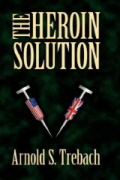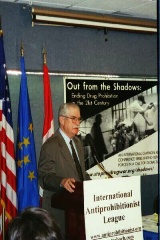Phillip S. Smith, Writer/Editor
When "The Heroin Solution" was first published by Yale University Press a quarter-century ago, it got rave reviews from the likes of the New York Times and Publishers Weekly. It was a mindblower. For the vast majority of readers, Arnold Trebach opened a window into an astonishing world they had never before imagined, one where -- gasp! -- doctors, not policemen, dealt with heroin and heroin users.

What Trebach did in the "Heroin Solution" was tell three interwoven stories: the story of heroin, the story of the American approach to heroin, and the story of the British approach to heroin. For many, that book was an awakening, a realization that there was an alternative to what by 1982 was already being reviled as an atrocious and failing policy of prohibition and repression. Where the American system denied that heroin had any medical utility whatsoever and jailed physicians, junkies, and hapless pain patients alike, the British system was kinder and gentler, with doctors given considerable latitude to prescribe heroin even -- and especially -- in cases where they knew they were only allowing their patients to maintain their addiction.
Now, "The Heroin Solution" is out in a second edition, the last volume of the "Trebach Trilogy," which also includes the reprinted "The Great Drug War" and last year's "Fatal Distraction." But this edition of "The Heroin Solution" is not a substantive reworking of the material; the only addition to the original volume is a new preface.
It still makes timely and compelling reading, but the reason why is hardly good news. "The Heroin Solution" is still relevant because we have progressed so little since it was written. The issues Trebach addressed in 1982 are, in many cases, the same issues we face today. Much has happened, but little has changed, and much of what has changed has changed for the worse.
In Britain, which Trebach described as a model of an enlightened (if not perfect) approach to heroin, the heavy hand of the state and governing medical bodies has slowly shrunk the space in which doctors may prescribe heroin. When Trebach wrote, probably a few thousand British addicts were being prescribed heroin; in his new preface, he estimates that perhaps 500 are. For all the talk of opiate maintenance in Britain, it seems like for the past quarter-century it seems like it's been one step forward, one step back.

Trebach asked in 1982 where America found itself nearly seven decades after passage of the Harrison Narcotics Act, and was not happy with the answer. It's much worse now. Back then, Trebach complained that the federal government spent $6 billion fighting the drug war in the 1970s; now $6 billion would fund the federal drug war for about three months. Since then, the prison population of the United States and the number of drug prisoners has gone through the roof. You know the drug war litany.
Trebach does, too, and that is part of the reason his thinking about drug prohibition has evolved over time. When he wrote "The Heroin Solution" in 1982, he called only for doctors to be allowed to prescribe heroin. Now, he is a full-blown anti-prohibitionist. Lack of progress on reforming US drug policy breeds more radical responses.
A revised and updated "The Heroin Solution" would be nice. There could be new chapters on the cutting-edge work on heroin maintenance going on in Switzerland and Germany, Spain and the Netherlands; the rise of safe injection sites; the trials in Vancouver; the spread of heroin addiction in Iran, Pakistan, and the Central Asian republics; and contemporary use patterns in the West, among others.
But 25 years after it was first published, "The Heroin Solution" is still relevant, still revelatory, and still a good read. Or, as Publishers Weekly said the first time around, "A blockbuster!"
This work by StoptheDrugWar.org is licensed under Creative Commons Attribution-ShareAlike 4.0 International
Comments
The second version of prohibition
It is so obvious that prohibition didn't work with alcohol, and it is just as obvious that the newer prohibition (some drugs) isn't working any better than the first edition of this unconstitutional atrocity. The only plausible reason it continues is that too many influential people are making some kind of profit from it.
Add new comment